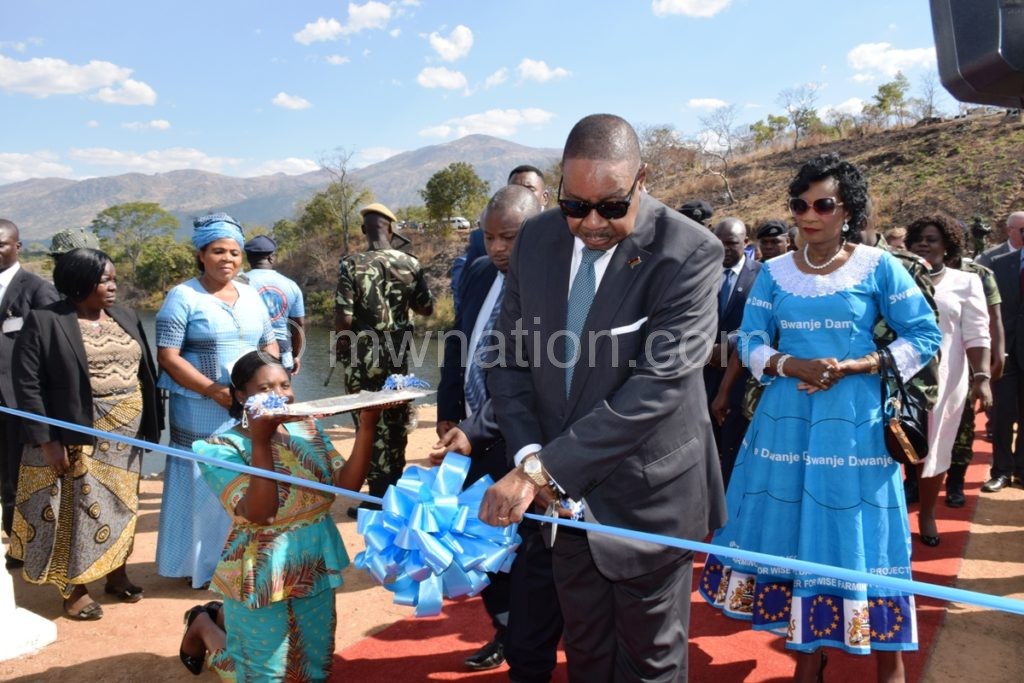Mutharika lauds mega irrigation project
President Peter Mutharika on Tuesday hailed the European Union (EU) for financing the Bwanje Valley Irrigation Dam project in Dedza District, saying it is a game-changer for the surrounding communities and the country at large.
The President said the project is in line with Democratic Progressive Party (DPP) government’s agenda as it will enhance food production, security and economic growth.

The dam is located in Mua-Livulezi Forest Reserve in Dedza East and is part of EU support for the implementation of Malawi’s Agricultural Sector Wide Approach (ASWAp) and the Green Belt Initiative.
Mutharika said his government’s vision is to eradicate hunger and poverty among Malawians; hence, the project is in tandem with the National Agriculture Policy and the Malawi Growth and Development Strategy (MGDS III), among others.
He said: “The project is of great importance to the country, especially communities in Bwanje Valley, as it will help to eradicate hunger and improve economic well-being of the livelihoods. Let me thank the EU for the support towards the implementation of this project that we are launching today.
“The irrigation scheme will create jobs as farmers will be able to produce all year round. Let me warn the people around the dam to desist from wanton cutting down of trees in order to protect the dam from environmental impact”.
EU charge d’affaires Virginie Lafleur-Tighe said the EU-ASWAp programme is supporting rural economic development through a 69 million euro contribution.
The EU ASWAp support includes the rehabilitation of 1 200 kilometres of rural roads connecting farmers to markets, implemented with the World Bank, and the establishment of the Irrigation Fund and the development of seven medium and large-scale irrigation schemes.
She said: “The construction of the Bwanje Valley Dam, the largest irrigation dam in Malawi, has been at a cost of over 11 million euros. The EU is a partner for growth in Malawi. Our support in constructing the Bwanje Dam reflects our strong commitment to support rural farming families.
“Our investments in irrigation demonstrate our commitment to help Malawi adjust to climate change.”
The Bwanje Valley Dam project covers 800 hectares (ha) and will benefit 1 778 households. On the other hand, the dam has an economic lifespan of 50 years while the irrigation scheme has a 30-year lifespan.
Currently the scheme produces about 4 000 metric tonnes of rice and is expected to double the production due to the irrigation dam that will facilitate winter cropping.
In random interviews, some farmers expressed excitement with the dam project, saying it will improve their productivity and economic well-being at household level.
One of the farmers at the scheme, Maxwell Mwalabu, said he was excited with the dam project as he will be able to have multiple harvests in a year.
He said he will be able to produce rice, maize, beans and vegetables which will improve food and nutrition as well as monetary gains as he will be able to sell the surplus.
Apart from the Bwanje project, the EU and partners have also funded several irrigation schemes totalling nearly 1 900 ha to benefit more than 42 000 Malawian farming families.
The other irrigation schemes include the Nkhotakota Chilingali Dam (150 ha), Dedza Tchanga (155 ha), Salima Lifuwu (155 ha), Lilongwe Mtete (160 ha), Chikwawa Mwalija (100 ha) and Chikwawa Phata (330 ha).
Minister of Agriculture Irrigation and Water Development Kondwani Nankhumwa said the ministry was excited to see the dam project completed to benefit farmers.
Water Users Association of Malawi president Timothy Kaupembe advised government to consider using the dam to provide potable water to the communities around the project, saying access to water remains a challenge in the area. Kaupembe also asked government to consider mounting a small-scale hydropower project to power the area with electricity.





